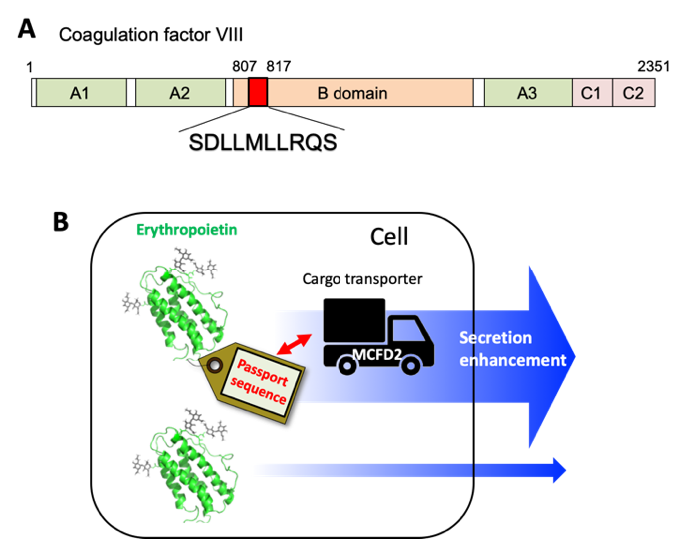Passport tagging for express cargo transportation in cells
March 18,2020
Many proteins produced by the cells are decorated with sugars and delivered out of the cells. In this secretory pathway, MCFD2 sorts and transports blood coagulation factors V and VIII as special cargos. The impairment of MCFD2 function results in a deficiency of these coagulation factors. The collaborative groups, including researchers at the Graduate School of Pharmaceutical Sciences of Nagoya City University, Exploratory Research Center on Life and Living Systems (ExCELLS), Institute for Molecular Science (IMS), and National Institute for Basic Biology (NIBB) of National Institutes of Natural Sciences, elucidated the molecular mechanisms behind MCFD2-mediated cargo transportation. The groups found that a 10-amino acid sequence is built into these coagulation factors as a "passport", which is recognized by MCFD2, and elimination of this sequence attenuates their cellular secretion. Moreover, they discovered that the intracellular transportation and consequent secretion of recombinant erythropoietin, a glycoprotein that is used to treat anemia, are significantly enhanced simply by tagging it with the factor VIII-derived passport sequence. Presently, most biopharmaceuticals are produced using mammalian cell cultures. The collaborative group findings provide the molecular basis for the intracellular trafficking of blood coagulation factors and an explanation for genetic deficiency as well as offer this "passport sequence" as a potentially useful tool for improving production yields of recombinant glycoproteins of biopharmaceutical interest.
Many proteins produced by the cells are decorated with sugars and delivered out of the cells. In this secretory pathway, MCFD2 sorts and transports blood coagulation factors V and VIII as special cargos. The impairment of MCFD2 function results in a deficiency of these coagulation factors. The collaborative groups, including researchers at the Graduate School of Pharmaceutical Sciences of Nagoya City University, Exploratory Research Center on Life and Living Systems (ExCELLS), Institute for Molecular Science (IMS), and National Institute for Basic Biology (NIBB) of National Institutes of Natural Sciences, elucidated the molecular mechanisms behind MCFD2-mediated cargo transportation. The groups found that a 10-amino acid sequence is built into these coagulation factors as a "passport", which is recognized by MCFD2, and elimination of this sequence attenuates their cellular secretion. Moreover, they discovered that the intracellular transportation and consequent secretion of recombinant erythropoietin, a glycoprotein that is used to treat anemia, are significantly enhanced simply by tagging it with the factor VIII-derived passport sequence. Presently, most biopharmaceuticals are produced using mammalian cell cultures. The collaborative group findings provide the molecular basis for the intracellular trafficking of blood coagulation factors and an explanation for genetic deficiency as well as offer this "passport sequence" as a potentially useful tool for improving production yields of recombinant glycoproteins of biopharmaceutical interest.
Passport tagging for express cargo transportation in cells
(A) The passport sequence built in coagulation factor VIII. (B) Secretion enhancement of biopharmaceuticals by tagging them with the passport sequence

| Title | Improving the secretion of biopharmaceutical glycoproteins using a molecular passport tag that is recognized by the cargo receptor |
| Author | Hirokazu Yagi, Maho Yagi-Utsumi, Rena Honda, Yusaku Ohta, Taiki Saito, Miho Nishio, Satoshi Ninagawa, Kousuke Suzuki, Takahiro Anzai, Yukiko Kamiya, Kazuhiro Aoki, Mahito Nakanishi, Tadashi Satoh & Koichi Kato |
| Article URL | |
| Researcher URL |


